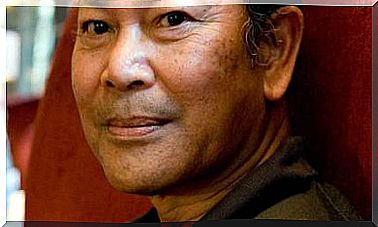Pride And Pride: Why It Appears In Some People And How To Deal With It
Pride in its most destructive aspect is associated with pride and hostility. Learn to face the pride of others and protect yourself.

- The shield of self-esteem
- The bulletproof vest of criticism
- How is arrogance and pride expressed?
- How to deal with the pride and arrogance of others?
Pride is a self-conscious feeling, it gives meaning to the “I”, and it has to do with attributions and evaluations of oneself with respect to others. It can have a very valuable positive side, and a very destructive negative side.
The shield of self-esteem
From the most favorable point of view, pride is related to the idea of satisfaction with oneself and one’s actions, self-esteem and self-confidence. It is deep gratification for an achievement as a result of hard work and it helps us feel secure in what we do.
We can also feel pride towards another person. In that case, admiration, respect and appreciation predominate .
Pride in a positive sense also represents self-assertion as a group, to highlight the feeling of belonging and claim rights as a collective.
This more constructive pride contributes to increasing self-confidence, and therefore fosters empathy for others.
The bulletproof vest of criticism
The most negative pride, which can even be destructive, is more associated with pride and hostility.
Although each case is different, behind pride there is usually a great inferiority complex. The use of arrogance disguises an oversized false self-esteem behind which a constant fear of being hurt can hide . Each critic, each different opinion, is experienced as a threat to personal identity.
As a metaphor, it may help to see the person with this destructive pride as a wounded child, who was not validated and who somehow received a lot of criticism for what he did, said or thought. That child was burdened with anger, with rage, for that lack of an approving look. All that arrogance, arrogance and hostility are nothing more than their defense mechanisms.
Continually comparing yourself, defending yourself, criticizing others to appear better, is motivated by the inferiority complex that in the medium-long term, wears you down and creates a great base of unhappiness. The way to defend your fragile identity is through vanity, making ostentatious displays of your achievements, your merits …
How is arrogance and pride expressed?
In the person with destructive pride, humility is conspicuous by its absence and, instead, there is contempt for those he considers inferior. In his superiority, he believes he deserves better treatment and privileges.
He also has a great incapacity for self-criticism and misjudges criticism because he does not recognize mistakes. Success, prestige and image in the face of others is essential.
He does not show the slightest interest in understanding the motivations of others or what the people around him feel. He is very self-referential, he can talk excessively, but only about what interests him.
Likewise, negative pride can exacerbate prejudice against groups designated as inferior or dangerous.
How to deal with the pride and arrogance of others?
Pride manifests the desire to be the favorite in front of others, which sometimes makes it seem that he lives in a distorted reality that prevents him from seeing and recognizing his limitations. The proud understand humility as a weakness, when in reality it is an attitude that allows us to be flexible and receptive in order to learn what we do not know.
Dealing with people with a high degree of vanity and pride puts us in a position in which our self-esteem and assertiveness constantly falter. Hearing constant criticism, contempt, and demands makes conflict almost inevitable.
Learning to deal with it and protect ourselves is a priority, and these ideas can help you do it:
- Visualize the person as a weak being who has no other tools to defend his wounded ego. This will help you not to personalize the criticism on you. Think of it as more of his fault than yours.
- Pride is insatiable, it takes for granted that nothing is going to be enough. Try not to get carried away by their excess of expectations.
- If you enter the rivalry, you have to lose. Be professional, but keep in mind that success and achievement do not have the same importance for you and that you have other priorities in your life that also contribute to your happiness.
- Take into account the limits that you are not going to allow to be transgressed, let them know and act accordingly: leave the conversation, leave the room … Do not let yourself be submitted.
- Arrogant people often arouse anger and are used to dealing with it. Treating them in a nice and polite way surprises them, and that will be your best asset. Be careful, don’t confuse being nice with being submissive.
- Train an assertive communicative style. Try to avoid outright criticism of the person, no matter how strongly you disagree. Begin sentences with “I believe / think / think that …” and try to find the common by using “I agree with you on …”.
- Accept that person as they are. There is nothing worse than the fantasy of change, thinking that the next time will be different. Mentalize yourself that it will not change, or at least that its change does not depend on you.
- Keep your goals in mind. If you think that you are going to be fooled or it is going to cause you a lot of anxiety and they will forget you, write them down and try to have them handy.
- Do not be blinded by their supposed achievements, most of the time they will be oversized.
- If you see that it surpasses you, it is good to distance yourself. Limit contact to what is essential.
- Seek support and help. They do not always know how to handle situations of this type and we need tools that we cannot learn by ourselves.
Always keep in mind that if you have discomfort, you have to seek help.









